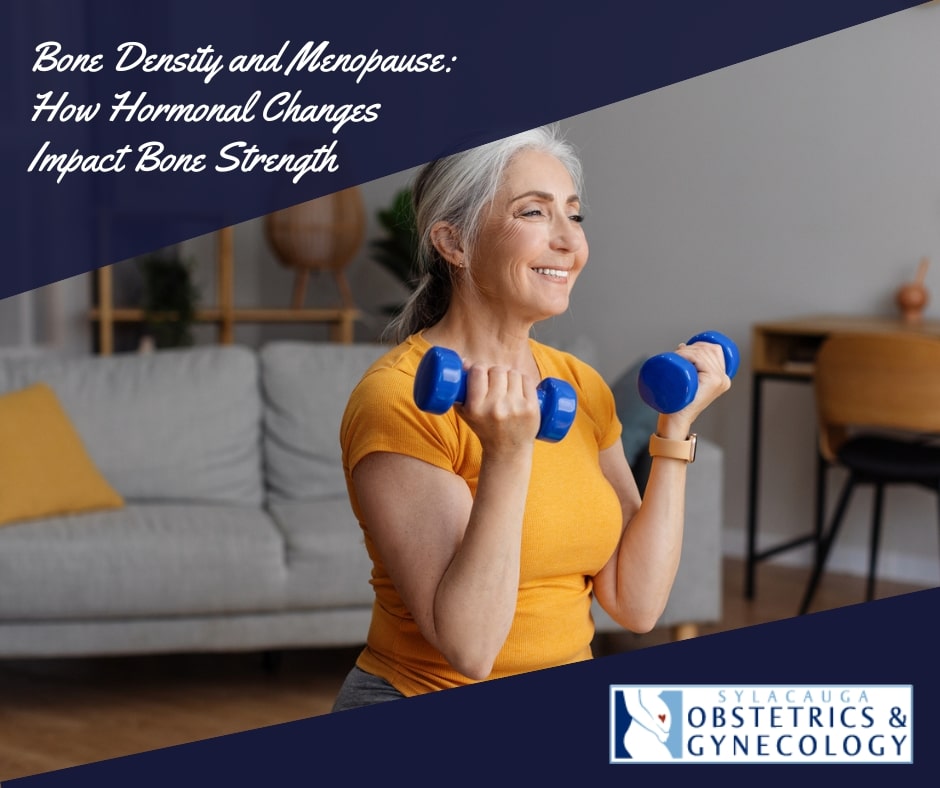
20 Nov Bone Density and Menopause: How Hormonal Changes Impact Bone Strength
Going through menopause is a huge transition that impacts every aspect of a woman’s life, even your bones! Your bones are your foundation, keeping your body strong and limber, so keeping them in good shape is crucial to overall well-being.
Understanding how this transition affects your bones and what you can do to keep them strong is essential. Today, Sylacauga OB-GYN will talk about how menopause impacts bone density, why this matters, and what steps you can take to support your bone health through diet, exercise, and more.
What Is Bone Density and Why Is It Important?
Bone density refers to the content of minerals, like calcium and phosphate, in your bones. Higher bone density means your bones are stronger and less likely to break. Good bone health is vital for staying active and independent as you age.
Throughout life, your bones are constantly being rebuilt. Old bone is broken down and replaced with new bone tissue. This process is usually balanced, but menopause can disrupt it, leading to potential bone loss.
How Menopause Affects Bone Strength
Menopause is a natural stage in life when estrogen levels decline. Estrogen is a hormone that plays a big role in keeping bones healthy. When estrogen drops during menopause, the way your bones are remodeled changes, which can lead to faster bone loss.
As a result, your bones may become thinner and weaker, making you more prone to conditions like osteoporosis and fractures. This can be concerning, but there are ways to help protect your bone health during this time.
The Role of Estrogen in Bone Health
Estrogen is essential for maintaining bone density. Here’s how it works:
- Building New Bone: Estrogen helps osteoblasts, the cells that build new bone, stay active and healthy. When estrogen levels drop, these cells can’t do their job to their full extent.
- Balancing Bone Breakdown: Estrogen also regulates osteoclasts, the cells that break down old bone. Without enough estrogen, these cells can become too active, leading to more bone loss.
- Absorbing Calcium: Estrogen aids in how well your body absorbs calcium, vital for bone strength.
- Mineralizing Bone: Estrogen helps deposit minerals into your bones, making them denser and stronger.
When estrogen levels fall during menopause, these protective functions weaken, which can lead to significant bone loss over time.
Signs of Bone Density Loss During Menopause
Bone density loss can sneak up on you, taking effect before you notice its symptoms. However, here are some signs that may indicate changes in your bone health:
- Back Pain: As bones weaken, they may be more likely to break, especially in the spine, which can cause persistent back pain or changes in height.
- Fractures: If you start breaking bones easily, particularly in your wrist, hip, or spine, this could signify bone density loss.
- Dental Issues: Weaker jawbones can lead to problems with your teeth, including loss.
- Posture Changes: Bone loss can change how you stand or sit, leading to a hunched posture over time.
Simple Lifestyle Changes to Support Bone Density
Even though menopause can lead to bone density loss, there are several lifestyle changes you can make to help protect your bones:
- Get Enough Calcium and Vitamin D: These nutrients are essential for bone health. Include sources like dairy, leafy greens, and fortified foods in your diet. Your doctor may recommend supplements if needed.
- Stay Active with Weight-Bearing Exercises: Regular activity, like walking, jogging, dancing, and strength training, can help keep your bones strong. Aim for consistent exercise to stimulate bone growth.
- Avoid Smoking and Limit Alcohol: Smoking and heavy drinking can speed up bone loss, so it’s best to cut back.
- Maintain a Healthy Weight: Both being underweight and overweight can impact bone density. Eating a balanced diet and staying active can help you reach and maintain a healthy weight.
By making these changes, you can actively support your bone health during menopause and beyond.
Finding Support for Menopause
Maintaining strong bones during menopause is essential for your overall health and well-being. By understanding how hormonal changes affect your bones, you can take steps to protect yourself.
Having a supportive team by your side is essential during this transition. At Sylacauga OB-GYN, we’re here to help. We offer personalized care and can guide you through managing symptoms, discussing treatment options, and creating a plan to support you during menopause.
Embrace the Change: Schedule Your Menopause Care Appointment Today!
At Sylacauga OB-GYN, we understand that menopause is a significant life transition that can bring about various changes and challenges. Our dedicated team is here to provide you with the personalized care and support you need during this time. Don’t navigate menopause alone—embrace the change by scheduling your appointment today!
With expert guidance, we’ll help you manage symptoms, discuss treatment options, and empower you to take control of your health. Prioritize your well-being and visit Sylacauga OB-GYN for the compassionate menopause care you deserve. Your journey to comfort and confidence starts here! You can schedule your consultation by contacting us online or calling us at (256) 510-7163.


